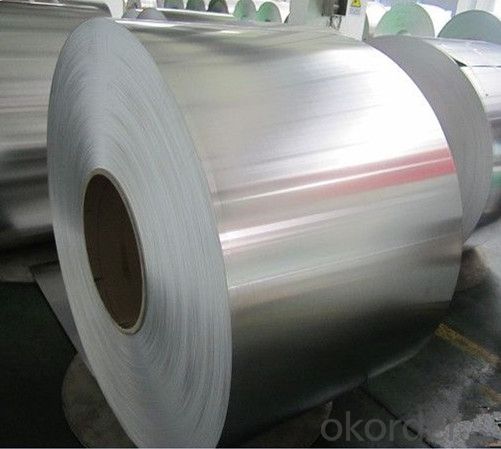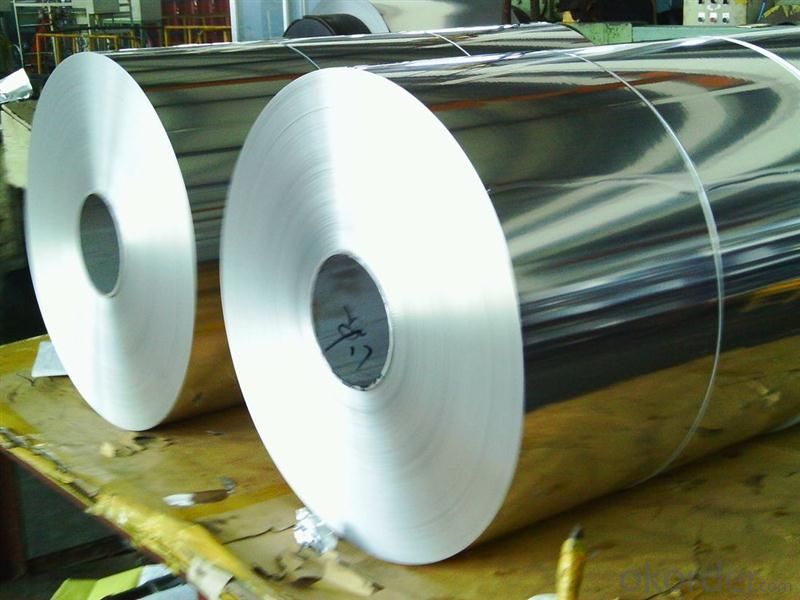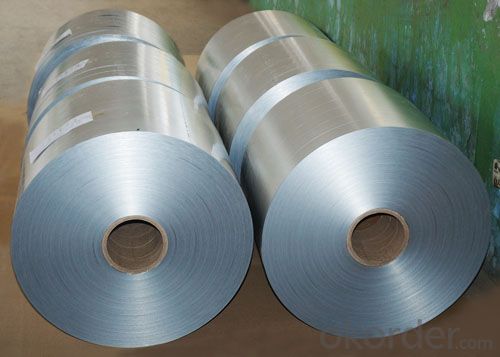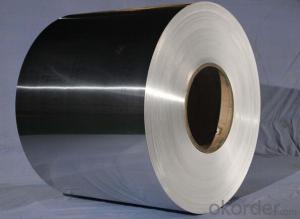Color Aluminum Coil Stock Alloy 1100 1060 1200
- Loading Port:
- Shanghai
- Payment Terms:
- TT OR LC
- Min Order Qty:
- 5 m.t.
- Supply Capability:
- 6000 m.t./month
OKorder Service Pledge
OKorder Financial Service
You Might Also Like
Item specifice
Applications:
Aluminum foil roll is widely used in construction,decoration,hardware,
electric appliances,machinery and other industrial and civil purposes,
such as electronic capacitor,composite cooker,rice cooker,refrigerator,
computer casting,telecommunication,equipment,lamp shade,air conditioner,
cosmetics cover and so on.
Or it can be made as customers’ requirement.
Specifications
color aluminum coil
1000 series 1100 10160 1200
surface could be: Brushed, drawing, embossed, printing
color: red,
color aluminum coil
.Alloy type: 1050/1060/1100/1350
2.Temper: H16, H18, H22, H24
3.Thickness range: 0.1mm-4mm
4.Width range: 25mm-1600mm
5.Surface:finish: bright & smooth surface, without flow lines, slight oiled to avoid white rusting.
6.Quality material:totally free from such defefects as roll marks, edge damager, camber, white rust, oil patches, holes, break lines,
color aluminum coil
Name |
color aluminum coil |
Alloy or not | yes |
Alloy | 1100H16/18, 3003H24,3003H26,3005H26,8011,3004,3105,5005,etc. |
Thickness | 0.1-4mm |
Width | ≤1600mm |
MOQ | 5T |
Coating finish | Brushed, drawing, embossed, printing |
Color | As to code RAL |
Surface | Embossed,Mill Finish,Coated,Brushed |
Gloss | 10-90%(EN ISO-2813:1994) |
Total coating thick | PVDF27 ~35micron |
Polyester18~27micron(EN ISO-2360:1995) | |
Coating hardness | 2H |
Adhesion | 5B (EN ISO-2409:1994) |
Impact resistance | No cracking and peeling (A.S.T.M D2794-1993) |
Flexibility (T-bend) | 0T- 2T |
MEK resistance | 100 |
Certification | ISO9001:2000, CE, SGS |
Coil's standard diameter | 1100mm |
Inner Diameter | 405mm/505mm |
Coil's standard weight | 2000kgs |



- Q:How does the alloy composition affect the properties of aluminum coils?
- The properties of aluminum coils are significantly influenced by their alloy composition. To enhance specific characteristics, aluminum is often combined with elements like copper, manganese, magnesium, and zinc. The strength of aluminum coils is a key property that is impacted by the alloy composition. Copper and zinc alloys, such as the popular 6061 or 7075 aluminum alloys, are renowned for their high strength, making them suitable for structural purposes. Conversely, manganese and magnesium alloys, like the 3003 or 5052 aluminum alloys, offer improved formability and are commonly used in the construction of automotive components or packaging materials. Corrosion resistance is also affected by the alloy composition of aluminum coils. For example, the addition of magnesium in alloys like 5052 or 5083 enhances their resistance to corrosion in marine environments, making them ideal for boat building or other marine applications. On the other hand, copper alloys possess excellent resistance to atmospheric corrosion and are frequently utilized in outdoor structures or architectural applications. The thermal conductivity of aluminum coils is another crucial property impacted by the alloy composition. Copper alloys exhibit high thermal conductivity, making them efficient for heat transfer applications such as heat exchangers or radiators. Aluminum-magnesium alloys, like 3003 or 3004, have lower thermal conductivity, making them suitable for applications where heat dissipation is desired, such as heat sinks in electronic devices. Additionally, the alloy composition can influence the electrical conductivity of aluminum coils. Copper alloys, with their high electrical conductivity, are commonly used in electrical wiring and conductors. However, aluminum-magnesium alloys, despite having lower electrical conductivity than copper, are still widely employed in electrical transmission lines and overhead power cables due to their lightweight nature. In conclusion, the alloy composition of aluminum coils plays a crucial role in determining their properties. It affects their strength, corrosion resistance, thermal conductivity, and electrical conductivity, allowing them to be customized for specific applications.
- Q:How do aluminum coils contribute to energy-efficient insulation?
- The role of aluminum coils in enhancing energy-efficient insulation cannot be overstated. To begin with, aluminum is an exceptional heat conductor, allowing it to effectively transfer heat away from its source and minimize heat penetration into insulated spaces. This quality ensures a stable and comfortable indoor environment, thereby reducing the need for excessive heating or cooling. Moreover, aluminum coils find extensive application in air conditioning and refrigeration systems, where they serve as the primary heat transfer medium. By efficiently absorbing and dissipating heat, these coils expedite the cooling process, resulting in reduced energy consumption and improved overall energy efficiency. Furthermore, the lightweight nature of aluminum makes it highly convenient for handling and installation in insulation systems. Its low weight provides flexibility and ease during manufacturing and transportation, leading to cost and energy savings. In addition, aluminum coils possess remarkable corrosion resistance, guaranteeing their durability and preventing the deterioration of insulation performance over time. This longevity ensures long-term energy efficiency as the insulation system remains effective without the need for frequent maintenance or replacement. In conclusion, aluminum coils significantly contribute to energy-efficient insulation through their effective heat conduction, facilitation of rapid cooling in air conditioning systems, reduced energy consumption, lightweight and easy handling, as well as long-lasting performance due to corrosion resistance. These qualities make aluminum coils the ideal choice for enhancing energy efficiency in insulation applications.
- Q:Can aluminum coils be used in curtain wall systems?
- Curtain wall systems can indeed incorporate aluminum coils. The lightweight property, durability, and resistance to corrosion make aluminum a favored material for curtain walls. Shaping and forming aluminum coils is a simple task, enabling the creation of desired profiles for these systems. Moreover, aluminum offers a broad spectrum of colors and finishes, allowing for customization and design adaptability. The utilization of aluminum coils in curtain wall systems also presents energy efficiency advantages, thanks to the commendable thermal conductivity properties of aluminum. In summary, aluminum coils are a fitting and widely employed material for constructing curtain wall systems.
- Q:What are the uses of aluminum coils?
- Aluminum coils have a wide range of uses across various industries. One of the primary uses of aluminum coils is in the manufacturing of HVAC systems and air conditioning units. The coils are used to transfer heat and cool air, making them essential components in these systems. Additionally, aluminum coils are also commonly used in the construction industry for roofing, cladding, and insulation purposes. They are lightweight, durable, and resistant to corrosion, making them ideal for outdoor applications. The automotive industry also utilizes aluminum coils in the production of vehicles. They are used in the manufacturing of various parts, including radiators, heat exchangers, and condensers, due to their excellent heat transfer properties. Aluminum coils are also extensively used in the packaging industry. They are used to produce cans and containers for food and beverages. Aluminum is a great choice for packaging as it is lightweight, recyclable, and provides a barrier against moisture, oxygen, and light, ensuring the quality and freshness of the enclosed products. Furthermore, aluminum coils find applications in electrical wiring, where they are used as conductors due to their high electrical conductivity. They are also used in the production of electronics, such as laptops, smartphones, and tablets, as they offer excellent heat dissipation properties. Overall, the uses of aluminum coils are diverse and varied, ranging from HVAC systems and construction to automotive, packaging, and electrical applications. The versatility, durability, and excellent properties of aluminum make it a preferred material choice in many industries.
- Q:What are the different yield strengths of aluminum coils?
- The yield strengths of aluminum coils can vary depending on the specific grade and temper of the aluminum. Generally, the range of yield strengths for aluminum coils can be anywhere from 15,000 to 75,000 pounds per square inch (psi).
- Q:What are the common surface finishes for aluminum coils in the automotive industry?
- In the automotive industry, aluminum coils are widely used for various applications due to their lightweight, high strength, and corrosion resistance properties. To enhance their appearance and protect them from environmental factors, aluminum coils in the automotive industry often undergo surface finishes. One of the most common surface finishes for aluminum coils in the automotive industry is anodizing. Anodizing is an electrochemical process that creates a thin protective layer on the surface of the aluminum coil. This finish not only provides excellent corrosion resistance but also allows for color customization, making it a popular choice for automotive applications. Anodized aluminum coils can be found in various colors and finishes, adding aesthetic appeal to the vehicles. Another commonly used surface finish for aluminum coils in the automotive industry is powder coating. Powder coating involves applying a dry powder paint onto the surface of the aluminum coil and then curing it under heat to create a durable, long-lasting finish. Powder coating provides excellent resistance to chipping, scratching, and fading, making it ideal for automotive components that are exposed to harsh conditions and require a high level of durability. Additionally, powder coating offers a wide range of color options, allowing manufacturers to achieve the desired aesthetic appearance. Furthermore, aluminum coils in the automotive industry may also undergo other surface finishes such as laminating, painting, or polishing, depending on the specific application requirements. Laminating involves bonding a thin protective film onto the surface of the aluminum coil to provide additional protection against abrasion and chemical exposure. Painting involves applying liquid paint onto the surface of the aluminum coil, allowing for customization and protection against corrosion. Polishing is a mechanical process that enhances the surface smoothness and appearance of the aluminum coil, providing a reflective and shiny finish. In summary, the common surface finishes for aluminum coils in the automotive industry include anodizing, powder coating, laminating, painting, and polishing. These finishes not only enhance the appearance of the aluminum coils but also provide protection against corrosion, abrasion, and other environmental factors, making them essential in the manufacturing of automotive components.
- Q:What are the different thickness options for aluminum coils?
- Various industrial and commercial applications can be catered to with a wide range of thickness options for aluminum coils. The thickness of these coils is typically measured in gauge or millimeters (mm). Aluminum coils are available in different thickness options: 1. Thin Gauge: Coils with a thin gauge usually have a thickness ranging from 0.15 mm to 0.4 mm. These coils are commonly utilized in applications that necessitate lightweight and flexible materials, such as packaging, electrical wiring, and insulation. 2. Standard Gauge: Coils with a standard gauge have thicknesses ranging from 0.4 mm to 2.5 mm. They find widespread use in industries like construction, automotive, and aerospace for applications like roofing, cladding, heat exchangers, and structural components. 3. Thick Gauge: Coils with a thick gauge typically have a thickness above 2.5 mm. These coils are predominantly employed in heavy-duty applications that require high strength, durability, and load-bearing capacity. Examples include shipbuilding, industrial machinery, and large-scale structural frameworks. It is important to note that the availability of specific thickness options may vary depending on the manufacturer and the intended application. Additionally, custom thicknesses can be manufactured to meet specific project requirements.
- Q:where is aluminum found in the world or in the universe?do u think aluminum is more valuable to people than gold?why or why not?im just lazy to look up the answers and person 4 best answer 10points
- where is aluminum found in the world aluminum is in fact the third most common element in the Earth's crust, and it is the most common metallic element on Earth. In a pure form, aluminum is silvery white and extremely lightweight. aluminum is more valuable to people than gold? aluminum continues to remake the modern world. We can see it everywhere; in architecture, transportation, electrical cables, communications and consumer products. Because it’s light-weight, strong, versatile and easy to recycle, aluminum is becoming more and more valuable in our daily lives melting point and boiling point Melting Point: 933.437 K (660.323°C or 1220.581°F) Boiling Point: 2792 K (2519°C or 4566°F)
- Q:How are aluminum coils processed for surface preparation?
- Aluminum coils are processed for surface preparation through a series of steps. Firstly, they undergo degreasing to remove any dirt, oil, or grease from the surface. This is followed by etching, where the coils are treated with an acidic solution to remove any impurities and provide a clean surface for coating. Next, the coils are rinsed and dried to ensure a residue-free surface. Finally, a conversion coating process is applied to enhance corrosion resistance and promote adhesion of subsequent coatings.
- Q:What is the typical thermal expansion coefficient for aluminum coils?
- The typical thermal expansion coefficient for aluminum coils is around 23 x 10^-6 per degree Celsius.
1. Manufacturer Overview |
|
|---|---|
| Location | |
| Year Established | |
| Annual Output Value | |
| Main Markets | |
| Company Certifications | |
2. Manufacturer Certificates |
|
|---|---|
| a) Certification Name | |
| Range | |
| Reference | |
| Validity Period | |
3. Manufacturer Capability |
|
|---|---|
| a)Trade Capacity | |
| Nearest Port | |
| Export Percentage | |
| No.of Employees in Trade Department | |
| Language Spoken: | |
| b)Factory Information | |
| Factory Size: | |
| No. of Production Lines | |
| Contract Manufacturing | |
| Product Price Range | |
Send your message to us
Color Aluminum Coil Stock Alloy 1100 1060 1200
- Loading Port:
- Shanghai
- Payment Terms:
- TT OR LC
- Min Order Qty:
- 5 m.t.
- Supply Capability:
- 6000 m.t./month
OKorder Service Pledge
OKorder Financial Service
Similar products
New products
Hot products
Hot Searches
Related keywords




























